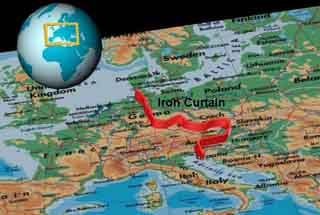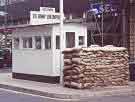Activity 2
Essential Question
- Why do competing world powers come into conflict?
Background
World War II was a struggle of allied powers against forces of Nazism (Germany), Fascism (Italy), and imperialistic nationalism (Japan). The allied side (the Big Three of the United States, Great Britain, and the Soviet Union), however, had its own divisions. The United States and Great Britain promoted liberal democracy but the Soviet Union practiced a communist dictatorship.

The Big Three managed to submerge their differences in a struggle for their lives against common enemies. When the war ended, however, the differences could no longer be submerged, especially since the Soviet Union, fearful of future invasions from the West, established control over much of Eastern Europe, and the United States and Great Britain, fearful of Soviet expansion, opposed the Soviets on many international policy issues.
The conflict among the former allies of World War II, which became known as the Cold War, lasted for almost a half century. It left many to fear that a third World War, a totally devastating nuclear war, would destroy western civilization and perhaps completely doom the human race.
This essential question focuses on how the Cold War began.
Instructional Strategies
 |
Strategy 1 |
Concept Attainment
The Cold War
- Have students on one side of the room write down on paper what the term "a hot war" brings to their minds, and after they have done that, have them share their ideas with each other in small groups. (Inform all students that they should not worry at this point about whether or not their ideas happen to be "accurate.")
- Have students on the other side of the room carry out the same task, except that they are to focus on the term "a cold war."
- Have students from the different groups share their ideas with the entire class. It is important at this stage that the teacher accept any ideas students have, that the teacher be a good listener, and that the teacher either record the students' ideas or have one of the students in the class do so.
- Have the students use their textbooks and essential knowledge to read about the Cold War. Tell them their purpose for reading is to find out how a "cold war" is different from a "hot war."
- Ask them to use the Concept Attainment Chart to list the characteristics of each type of war. Have them brainstorm their ideas with a classmate and record them on both of their charts.
The Cold War
Brainstorm with a classmate and record your ideas about one of the following concepts:
a hot war |
a cold war |
 Scoring Guide
Scoring Guide
Check for Understanding
When they are finished brainstorming, have them describe each of the concepts using the notes from their Concept Attainment Chart.
 |
Strategy 2 |
Gaining Perspective Through Interviews
- Talk about what kind of information can be obtained from interviewing people who have actually lived through the events you are studying in school.
- Tell them that the perspectives of others on a topic like the cold war may be entirely different from what they read in the textbook and may change their ideas about the Cold War
- Talk about the following steps in the interview process:
- Plan as a class how adults in the community are to be interviewed. For example, will students interview members of their own family? Will they interview people of different generations? How will they collect their information? And so on. Information about Oral History Interviews is available from Using Oral History, a Library of Congress Learning Page.
- Have students determine their interview questions related to human experiences and remembrances of the "Cold War".
- Have students carry out their interviews, bring back to class the data they collect, and draw conclusions.
- Be sure the students follow-up the interview with a thank you letter.
Check for Understanding |
 Printable
Student View Printable
Student View |
- Based on your interview define and explain the term "the cold war"
- How are your ideas today about the Cold War different from those you had before this interview learning activity?
 |
Strategy 3 |
Historian's Perspective
Talk about the job of a historian. Decide with the class if historians can ever be totally objective in their interpretation of history. What factors might interfere with their objectivity?Use these web links as a resource for historians with opposing viewpoints of these Cold War topics:
- From Allies to Enemies: The Origins of the Cold War
- Coexistence and Conflict
- From Détente to the Cold War's End
- Reflections: The Impact of the Cold War
Use this chart to organize your thoughts as you read the excerpts.
| Cold War Topic | My Interpretation | Interpretation by Historian __________ |
Interpretation by Historian __________ |
Check for Understanding
- Why might these historians have different interpretations?

 All Modules
All Modules Printable View
Printable View